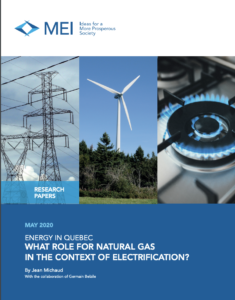
Natural gas needed to supplement electrification of Quebec’s economy: MEI
May 13, 2020 | By HPAC Magazine
Independent think tank, the Montreal Economic Institute, publishes research paper entitled 'Energy in Quebec: What Role for Natural Gas in the Context of Electrification?' outlining the long-term need for gas going forward.
 Despite talk of electrifying the entire Quebec economy, independent think tank, the Montreal Economic Institute (MEI), reveals an ongoing need for natural gas to satisfy demand in the future.
Despite talk of electrifying the entire Quebec economy, independent think tank, the Montreal Economic Institute (MEI), reveals an ongoing need for natural gas to satisfy demand in the future.
MEI has released a research paper entitled Energy in Quebec: What Role for Natural Gas in the Context of Electrification? outlining the province’s energy profile, quantifying its hydroelectric potential, and identifying natural gas as a realistic solution for meeting Quebec’s energy needs.
Fossil fuels currently account for the majority (56%) of Quebec’s energy consumption, while electricity represents 36%.
“Quebecers sometimes seem to believe that electricity is king in Quebec, but the numbers clearly indicate the opposite,” points out Jean Michaud, engineer and co-author of the paper.
“Quebec is particular in that it uses electricity rather than natural gas for heating. The mathematical reality is that much too high a percentage of Hydro-Québec’s capacity is already in use during peak periods for people to be able to charge their cars at the same time,” adds Mr. Michaud.
According to the authors, the projected 5.4 million electric personal vehicles that would hypothetically be circulating on Quebec roads would require around 37,350 MW just to recharge each day, or almost as much as the province’s peak demand in winter.
“Alternatives like solar or geothermal power are often proposed. As things currently stand, however, these energy sources are not efficient, reliable, or affordable enough,” says Germain Belzile, senior fellow at the MEI and co-author of the report.
When looking at other alternative energy sources, geothermal power’s main drawback is its high installation cost, but certain public buildings should be able to accept higher initial financing costs, and although insulating buildings, installing better windows and other similar energy efficiency initiatives are the least costly ways of reducing residential, commercial, and industrial energy demand the low price of hydroelectricity in Quebec reduces the benefits stemming from such measures.
“Quebec’s recoverable natural gas reserves would be able to meet our needs for at least the next 40 years, and we would only need a limited number of new gas pipelines. The current price of natural gas makes the development of this resource unattractive for companies, yet this remains an entirely realistic and desirable alternative for the future,” adds Mr. Belzile.




